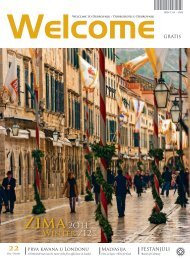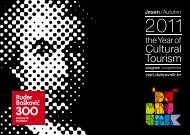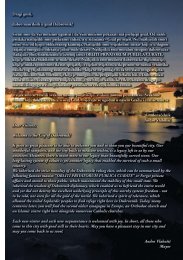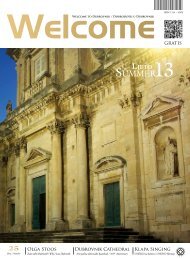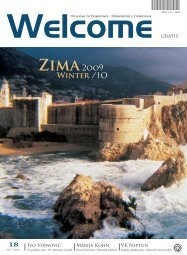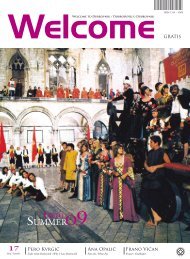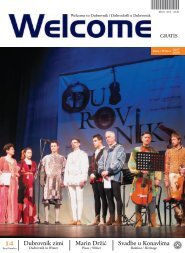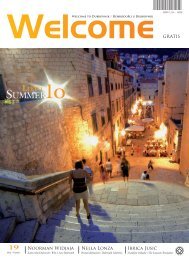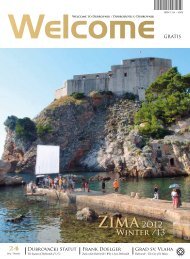21. Welcome to Dubrovnik - TuristiÄka zajednica grada Dubrovnika
21. Welcome to Dubrovnik - TuristiÄka zajednica grada Dubrovnika
21. Welcome to Dubrovnik - TuristiÄka zajednica grada Dubrovnika
Create successful ePaper yourself
Turn your PDF publications into a flip-book with our unique Google optimized e-Paper software.
Napisala/By TEREZA BUCONIĆ GOVIĆdavno su doba sve baštine, polja Čučnu, drže srp u desnici, ljevicom sway rhythmically. He moves slowly, withU i po<strong>to</strong>ci bili potrebni čovjeku. zahvate otkos, odozdo presijeku ihis legs slightly apart and his arms inŽivio je od svoga rada i darova zemlje,a ta je zemlja vječi<strong>to</strong> bila obrađena,nadgledana i ljubljena.U zrelo lje<strong>to</strong> uputio bi se težak poslomveć u rano jutro. Trave bi na poljimaveć njihale visoke vlati, a među njimase crvenjeli makovi i procvale glavekamomile. Bio bi mjesec srpanj kad sesvlače sjenokoše, a po<strong>to</strong>ci i žitnjaci čisteod trava i klasova prezrelog žita.Ide čovjek poljem, a na ramenu nosikosu. Sječivo joj oštro, savijeno, ljeska nasuncu. Drška glatka, podatna ljudskojruci.Košenje sjenokoša počinje s jednog krajai zbog <strong>to</strong>ga se ritmično njiše tijelokosca. On se polako miče, nogu maloraširenih, ruku u ritmu sijača, a ispodnjegovih se nogupolože klasje u pravilnom nizu, sličnomkaligrafskom potezu vještih slikara.Kose i srpovi rade čitav <strong>to</strong>pli i veselisrpanj. Ustaju noću ili zorom, druže se sotkosom, mirišu trave, podižu prepelice,plaše kornjače, i nakon njihova prolaza,kad je livada pokošena, ži<strong>to</strong> posrpano,po<strong>to</strong>ci čisti u kamenoj kralježnici međa,dolazi sunce i poljupcima suši sokovekoji mirišu po zemlji, kruhu i čis<strong>to</strong>jljepoti bogate plodnosti.the rhythm of sowers, leaving the swathsunder his feet. The rows of mown grasssmelling of the young, green, frisky juiceare full of the beautiful, soft, purple ivaheads, wild grain and clover flowers.At the same time women cut down grasswith sickles in the overgrown stream beds.Gentle and green, they abound with softnewly grown grass under which <strong>to</strong>r<strong>to</strong>isesand snake lizards crawl and grasshoppersjump high. The sickle is curved like aspine. It quickly cuts handfuls of grassin the skilful hands of women bent inthe stream beds. Every now and thenthey pull themselves upright and placehandfuls of grass on a drys<strong>to</strong>ne wall.The sickle goes <strong>to</strong> wheat fields <strong>to</strong>o, in thenight when the moon in the skysmiles at the sickles, lookingSickle and Scytheslažu otkosi trave.like one of them. A group ofMiriše trava powomen walks dark paths in themladom, zelenom,mist wet with dew, when grasses arevrckavom sokusoft and pliant, singing in order <strong>to</strong> driveIi leži u naručjima, u pregrštima punan ancient timesaway the night fear.lijepih mekanih glava ljubičaste ive,the man neededThere where grain, wheat, lentil and peadivljeg žita i procvale djeteline.Žene za <strong>to</strong> vrijeme srpovima brsteozelenjele po<strong>to</strong>ke. U njima je blagostzelenila, mekoća izniklih trava ispodkojih se provlače kornjače i blavori, au zrak odskaču skakavci. Srp je savijenpoput kralježnice i on u vještim rukamahitro siječe rukoveti, a žene se, prignuteu uskoči po<strong>to</strong>ka, svako malo uspravljajui pregršti stavljaju na kamenu među.Srp putuje i na žitnjake, i <strong>to</strong> noću kad semjesec s neba smije srpovima, i sam nasrpove nalik. Ide kolona žena mračnimpu<strong>to</strong>vima, u sumaglici rose kad su travemekane i savitljive, a one putem pjevajuda bi otklonile noćnu zebnju i strah.Tamo gdje raste ži<strong>to</strong>, pšenica, leća igrašak, rasporede se žene poput kosaca.all property, fields and streams.He lived from his work and land’s gifts,and his land was always cultivated,cherished and loved.In midsummer he began his hard workearly in the morning. The grasses in thefield were already high, with red poppyand chamomile flowers between them.The month of July was the time whenpeople mowed grass and heavy ears ofgrain in the valleys and fields.A man walks across the field, carryinga scythe on his shoulder. Sharp andcurved, its blade glitters in the sun. Itshandle is smooth and well-suited <strong>to</strong> thehuman hand.The mowing begins from one end,which causes the scytheman’s body <strong>to</strong>grow, women line up like scythemen.They squat, hold the sickle in their righthand, grab the swaths with their left andcut them from below. The stalks are laiddown in regular rows, reminiscent of amasterful calligraphic writing.Sickles and scythes are busy during theentire warm and merry month of July.They get up at night or in the morning,associate with swaths, smell grass, andstartle quails and <strong>to</strong>r<strong>to</strong>ises. After theyleave and the grass is cut, the grain mown,and the stream beds between drys<strong>to</strong>newalls cleared, the sun comes and drieswith its kisses the juices which smell ofthe soil, bread and pure beauty of mellowfruitfulness.SUMMER 2011WELCOME TO DUBROVNIK 57




